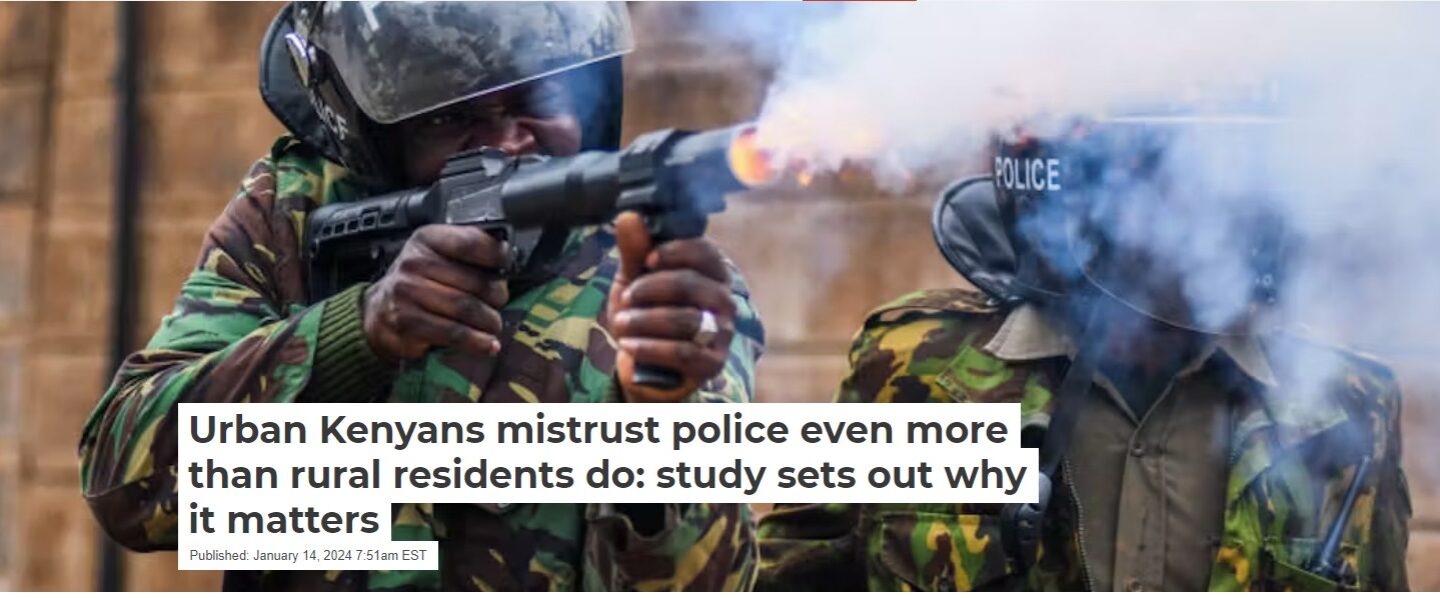« Ariel Henry has no credentials to continue speaking on behalf of Haitians who have already rejected him“, declares human rights leader, Josué Renaud.
Kenya’s High Court blocks proposal to send police support to Haiti
Kenya’s High Court on January 26 rejected President Ruto’s proposal to deploy police personnel to combat gangs in Haiti. The decision leaves the plan in limbo, with the government having 14 days to appeal.
As mentioned in a previous article, Kenya had offered 1,000 police officers in response to Haiti’s call for international assistance against violent gangs. This led the United Nations Security Council to adopt a resolution authorizing a non-UN multinational security support mission (MSS) in Haiti in October 2023.
Kenya’s High Court has temporarily blocked the Kenyan government’s proposal to direct a multinational security force to Haiti sending police officers to stem gang violence. This decision was made on January 26, 2024. The court’s decision means that the deployment was deemed illegal. Justice Chacha Mwita described the proposed deployment as unconstitutional, null and void: “The effort, and in particular the attempt to deploy police officers to Haiti, must fail for lack of constitutional and legal basis. »
The case was brought to court by opposition leader Ekuru Aukot of the Thirdway Alliance party, on the grounds that it violated the constitution, which provides for the deployment of the army abroad, but not agents from police. The government said it would appeal the decision.
In its haste to execute the peacekeeping mission in Haiti, the Kenyan government omitted a number of obligations, including constitutional provisions; public participation and perception; and the available alternatives, which should have been resolved before the announcement. According to a Nairobi-based security and political expert: “The whole process [de déploiement] has been chaotic and shrouded in secrecy. It was obvious from the start that the court would block him; even the government itself knew about it. »
The court’s decision does not stop the Haiti deployment per se. Instead, it found the manner and process of the execution illegal, and declared illegal the assertion that the president has the authority to deploy police personnel abroad. By following the legal process, Kenya could theoretically still deploy a police force to Haiti.
Kenyan authorities have three legal avenues to save the Haitian mission they offered to lead. They could appeal the court’s decision; they could restart the process by invoking the reciprocity clause in Kenyan law; or they could propose sending an African Union-led force, in which Kenya would play a lead role.
The government has until February 15 to challenge the court’s decision. Authorities remain tight-lipped on the potential grounds for the appeal, but legal experts predict a protracted legal fight given the detailed and broad nature of Justice Mwita’s judgment. “It will be a very difficult task to reverse. Expect this to end up in the Supreme Court, if they appeal,” said a state counselor. Given that Haiti is overwhelmed by violence, with gangs controlling more than 80% of Port-au-Prince, Kenyan authorities cannot afford a lengthy court case.
Reflection on reciprocity
Kenyan law provides a mechanism whereby police officers can be deployed abroad if there is a reciprocal arrangement with the host country. However, no such arrangement is currently in place between Kenya and Haiti. During court hearings, the Law Society of Kenya told the judge that a bilateral treaty should have been in place in order to operationalize a reciprocal agreement and give effect to the law which provides for reciprocity. An opposition lawmaker echoed this, arguing that the issue of reciprocity should have been addressed before the deployment was announced.
The question now is whether Haiti has a government capable of executing a bilateral treaty with Kenya. Ruto believes so, and says the Caribbean country has already started the process towards such a treaty. However, a proposed bilateral reciprocal agreement with Haiti must first be subject to public participation. This could be a challenge for Ruto’s government given public cynicism over the proposed police peacekeeping mission. First, the plan to send a security force was conceptualized without prior public consultation. Second, Kenya faces its own internal security crises – street gangs in Nairobi and Mombasa, cattle rustling in the north and the threat of al-Shabaab on the coast, all of which require urgent police attention. Many therefore believe that Kenya cannot afford to release police officers.
AU Contingency
Authorities are considering the possibility of facilitating a police force under the auspices of the African Union (AU), in which Kenya would play a central role. The practicability of this idea is uncertain, but it could be coordinated under the AU Police Cooperation Mechanism (or AFRIPOL), where Kenya served as chair of the General Assembly. One of AFRIPOL’s objectives is to strengthen coordination between police forces deployed in AU-led peacekeeping operations, in terms of planning, mobilization, deployment and management.
Kenya has a history of participating in AU-led police missions abroad, including the first joint INTERPOL and AFRIPOL operation against human trafficking and migrant smuggling. During this operation, officers from both agencies were deployed to the field to support local law enforcement in several countries.
Nelson Koech, chairman of Parliament’s Defense, Intelligence and Diaspora Affairs Committee, recently revealed that Kenya had police officers in South Sudan, and that they had previously served elsewhere, including Somalia. These deployments were part of AU-led missions.
Benefits
How Kenya will resolve the imbroglio remains to be seen. However, what is hardly disputed is the likely benefit of the Haitian mission to Kenya and its political leaders. Despite the plan being blocked, Justice Mwita said: “There is no doubt that it is a great honor for Kenya to offer to lead the multinational security support mission in Haiti. Likewise, Kenya has an obligation to join the community of nations to assist Haiti as part of its international obligations. »
Like any other nation, it is not surprising that Kenya would seek to use the mission to improve its image, which includes providing diplomatic assistance where necessary. From June 2020 to December 2023, when it served on the United Nations Security Council, Kenya played a key role in brokering global peace. Wishing to lead the multinational mission in Haiti is therefore part of the continuation of this effort.
Sibi Nyaoga, writing for the Atlantic Council, observed: “A police mission to Haiti could further raise Kenya’s profile as a champion of African interests. » And according to Dr Luchetu Likaka, an expert in criminal justice and security management, “the deployment (to Haiti) could have raised Kenya’s profile as a champion of African interests”.
For President Ruto, the Haitian problem offers him the opportunity to seek to be recognized as a leader with the courage, capacity and willingness to contribute to solving geopolitical problems in situations where other heads of state might have cold feet. Achieving such global respect could sway even critics who still doubt his legitimacy as president following August’s hotly contested presidential elections.
However, the road to Haiti remains strewn with pitfalls, and the Kenyan government will have to face legal, diplomatic and logistical challenges to overcome this crisis and carry out its “humanitarian” mission to save soldier Ariel Henry. The path from Kenya to Haiti is likely to be long and winding.








